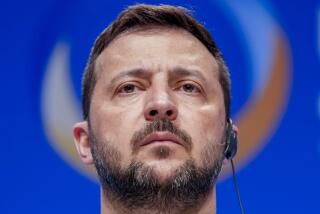Obscure Group May Take Lead in Debate on Europeâs Security : Diplomacy: NATO and the Warsaw Pact may be pushed into the background in favor of the Conference on Security and Cooperation in Europe.
WASHINGTON â With the future of Germany shaping up as the most perplexing issue of this weekâs summit, President Bush and Soviet President Mikhail S. Gorbachev may turn to an obscure and unwieldy international organization to provide a European security framework that both sides can accept.
The 35-nation Conference on Security and Cooperation in Europe (CSCE) has no headquarters and no staff, but it is the only major political forum outside of the United Nations that counts both the United States and the Soviet Union among its members.
Both Washington and Moscow want to give new stature and responsibility to the 15-year-old organization that carefully straddled the ideological debates of the Cold War. Secretary of State James A. Baker III recently said that the group âcould become the most important forum of East-West cooperation.â
For the Bush-Gorbachev summit, the organizationâs most important asset is its acceptability to both superpowers.
The Soviet Union has suggested replacing the North Atlantic Treaty Organization and the Warsaw Pact with a Europe-wide security organization, presumably under CSCE auspices. The Bush Administration is unwilling to dismantle NATO, but it wants to give CSCE new powers to settle disputes among member nations without military force.
Administration officials hope that Gorbachev will soften his opposition to NATO membership for a united Germany if he is assured that CSCEâs security and conflict-resolution role will be substantially strengthened.
While it is far from certain that Gorbachev will accept such a plan, the officials reason that if he is genuinely worried that a united Germany in NATO is a threat to Soviet security, then an enhanced CSCE role should reassure him.
And if his concern is only to avoid the humiliation of seeing East Germany, once a keystone of the Soviet-led Warsaw Pact, joining the rival alliance, the CSCE compromise may give him a diplomatic fig leaf, the officials say.
âWe are prepared to look at a variety of things that might help Gorbachev over the psychological problems he has over NATO,â a senior Administration official said. âThere are things we are prepared to do to ease the difficulty he faces in going along with it.â
The group began in 1975 as a conference in Helsinki attended by the United States, Canada and all of the nations of Europe except then-staunchly isolationist Albania. It adopted a series of resolutions ratifying the postwar borders of Europe and committing the member states to a sweeping human rights program.
President Gerald R. Ford went to Helsinki to sign the final accord, although he did so reluctantly because he was unimpressed with the conferenceâs work. Conservative American critics complained that the conference ratified the East-West division of Europe and border revisions. Those revisions incorporated into Poland territory that was German before the war and awarded to the Soviet Union territory that had been Polish. Critics said that the West got nothing in return.
In retrospect, however, the 1975 conference was one of the pivotal events of the last half of the 20th Century. Its human rights report emboldened dissidents throughout Eastern Europe, starting a process that led ultimately to the disintegration of repressive Communist governments across the region.
For instance, Vaclav Havel, now president of Czechoslovakia, first became involved in politics as a member of a group established to monitor the Prague regimeâs compliance with the Helsinki accords.
Nevertheless, it seems unlikely that the CSCE process can live up to the expectations of its supporters without undergoing substantial changes. The organization acts by unanimous consent, which means that any of the 35 states--including such tiny nations as Malta, San Marino and the Vatican--have veto power.
âCSCE has lots of defects,â said Gregory F. Treverton, a senior fellow of the non-governmental Council on Foreign Relations. âBut it has the virtue of having the United States there and the Soviet Union there. That makes it a logical place (for East-West negotiations).â
Treverton said that the conference can be used as an umbrella to cover negotiations among smaller groups of nations, which could then report âto the 35 without any thought that the San Marinoians would have a veto.â
The 23-nation session now going on in Vienna about reducing troop deployments and conventional weapons in Europe is technically a CSCE subcommittee. However, the arms talks involve only NATO and Warsaw Pact members.
Although there have been a number of CSCE meetings since 1975, the organization has resisted the impulse to establish a permanent bureaucracy. Staff work for meetings is provided by the host country, and there is no address for CSCE between sessions. But all that may be about to change.
âThere have been various suggestions by the Czechs and others to begin to institutionalize it with a secretariat and regular meetings of foreign ministers,â said Helmut Sonnenfeldt, a former State Department and National Security Council official who is a senior fellow of the Brookings Institution in Washington. âThe East and Central Europeans see a special need for themselves to have some security guarantees that would require institutionalized security arrangements.â
In a speech last December in Berlin, Baker called for CSCE to adopt measures to âprevent force, or the threat of force, from being used again in an effort to intimidate any European nation.â
More to Read
Sign up for Essential California
The most important California stories and recommendations in your inbox every morning.
You may occasionally receive promotional content from the Los Angeles Times.










